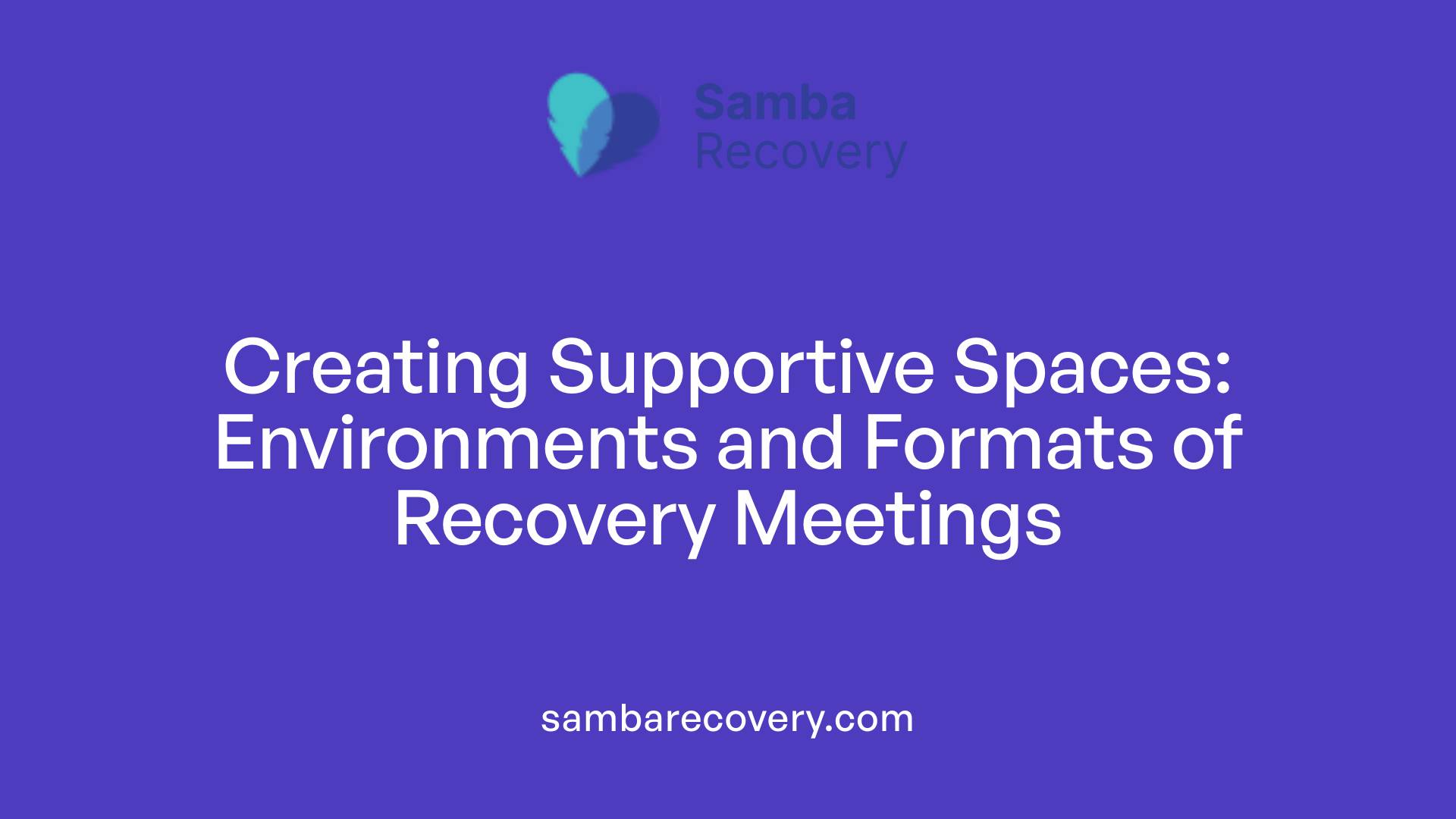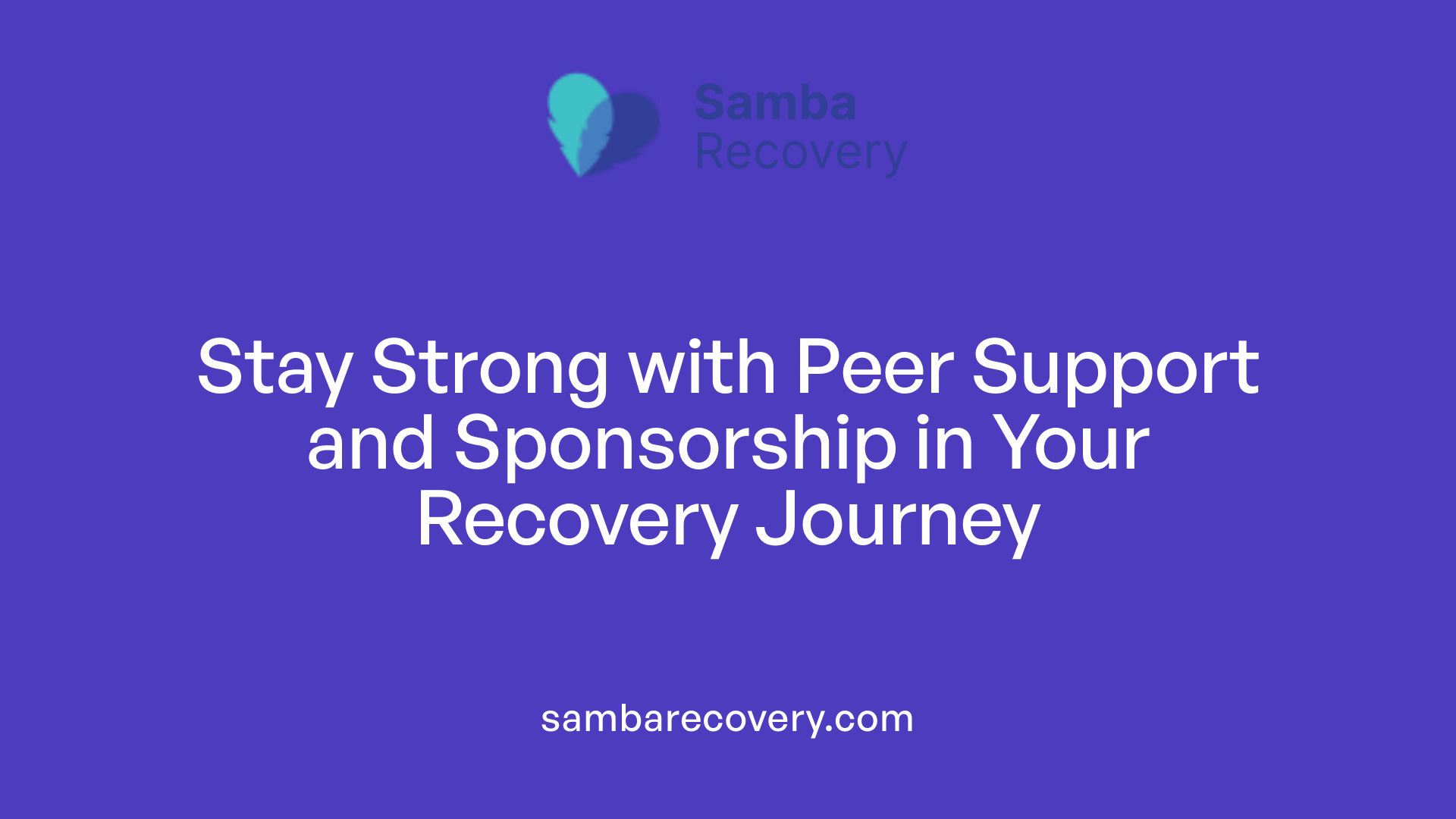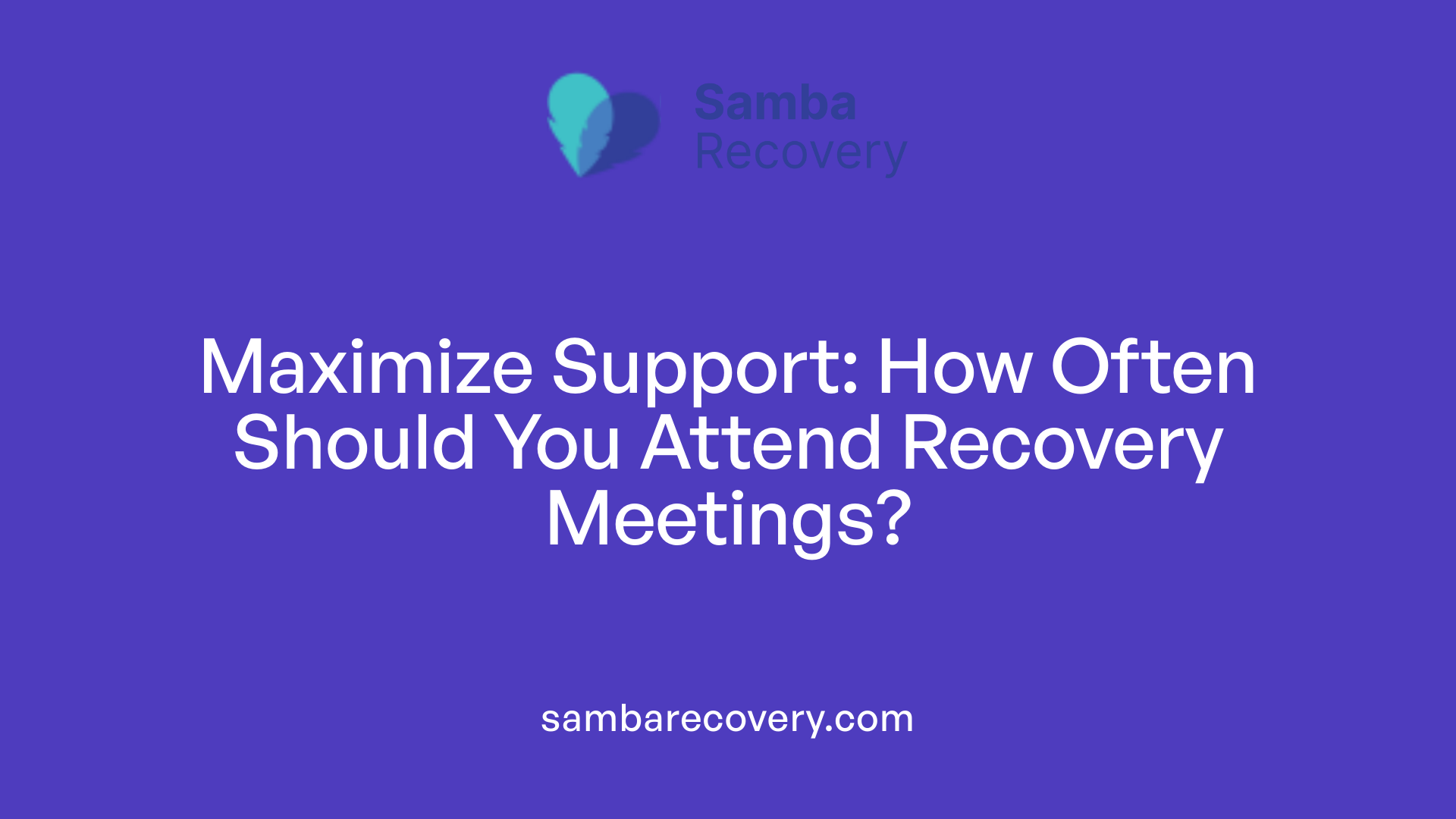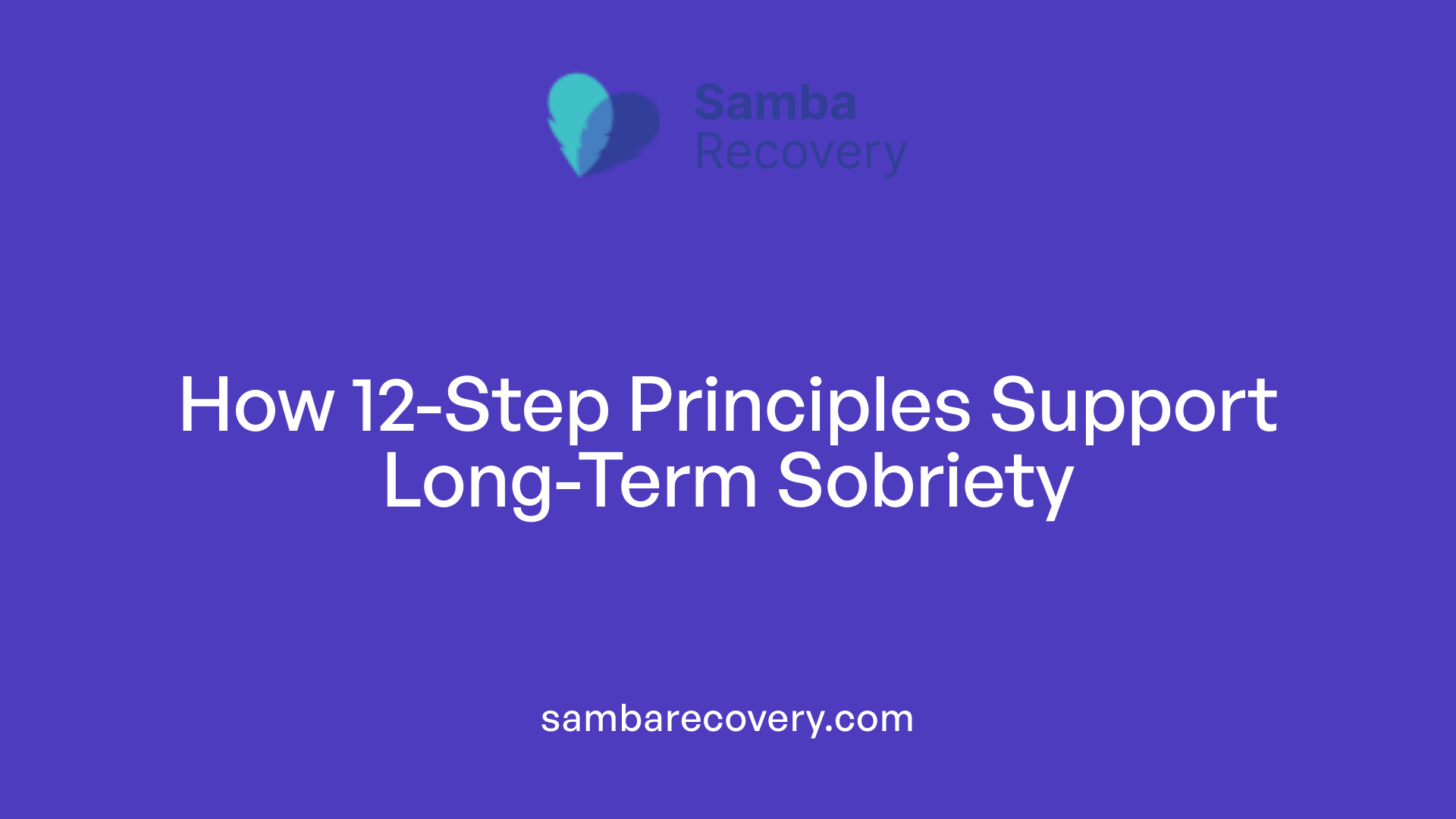Attending and benefiting from recovery meetings
August 1, 2025
Building a Foundation for Lasting Sobriety

The Significance of Recovery Meetings in Addiction Recovery
Recovery meetings, such as Alcoholics Anonymous (AA) and Narcotics Anonymous (NA), are vital components of addiction treatment that offer ongoing support, structure, and community. They create a safe environment where individuals can share their experiences, learn coping strategies, and build meaningful connections with peers who understand the struggles of addiction. Participation in these groups not only sustains sobriety but also promotes personal growth, emotional well-being, and a sense of purpose.
The Therapeutic Environment and Formats of Recovery Meetings

What are the typical formats and environments of recovery meetings?
Recovery meetings usually follow a structured yet flexible format that creates a supportive space for individuals to share their experiences and learn from others. They can take various forms, such as discussion meetings, where participants talk about specific topics related to addiction and recovery. Speaker meetings feature individuals sharing personal stories about their journey to sobriety, providing inspiration and practical insights. Specialized sessions focus on the Twelve Steps, Traditions, or related literature, offering in-depth understanding and spiritual growth.
The environment where these meetings occur varies widely. Many are held in community-oriented spaces like churches, community centers, or treatment facilities. Some meetings take place outdoors or in less traditional settings to promote comfort and accessibility. With advancements in technology, online platforms have become increasingly popular, offering video or audio-based meetings that increase access for those with mobility issues, travel restrictions, or social anxiety.
Most meetings begin with a preamble, such as the well-known AA preamble, followed by moments of silence or prayer if desired. They often include readings from recovery literature like the Big Book or specific Step guides. The latter part of the meeting typically involves members sharing their experiences, challenges, and successes, fostering a sense of community and mutual support. These components aim to create a respectful, encouraging environment suited to the diverse needs of attendees.
How do recovery meetings, such as AA and NA, support ongoing sobriety?
Recovery meetings like Alcoholics Anonymous (AA) and Narcotics Anonymous (NA) play a crucial role in maintaining long-term sobriety. Regular attendance helps individuals build a consistent community where they can share their struggles and triumphs, reinforcing their commitment to sobriety. These groups facilitate the ongoing practice of the 12 Steps and other recovery tools, which enhances self-awareness, accountability, and resilience.
Participation in these meetings provides emotional support that reduces feelings of loneliness and shame, common triggers for relapse. They also serve as a safe environment to discuss cravings, setbacks, and personal growth, which helps in early detection of relapse risks. The collective positive reinforcement, stories of recovery, and practical advice encourage perseverance.
Moreover, ongoing engagement in support groups contributes to smoother transitions from treatment settings back into daily life. They bolster motivation, bolster self-efficacy, and help individuals develop coping skills essential for long-term sobriety. This consistent support is vital because recovery is an ongoing process, and these meetings provide the stable foundation necessary to sustain it.
The Role of Peer Support and Sponsorship in Sustaining Recovery

What role does peer support and sponsorship play in recovery meetings?
In recovery meetings, peer support and sponsorship are fundamental elements that help individuals navigate their path to sobriety. Sponsors, typically experienced members of the group, guide newcomers through the twelve steps, offering personalized advice rooted in their own recovery journeys. They serve as role models, demonstrating the practical application of recovery principles and providing ongoing encouragement.
Peer support groups foster a sense of community where individuals can share their experiences, struggles, and successes in a safe, non-judgmental environment. This mutual support reduces feelings of loneliness and shame, reinforcing motivation to stay sober.
These relationships promote accountability, helping individuals stay committed by offering regular check-ins and emotional reinforcement. They also assist in developing coping skills and strategies to handle triggers and setbacks, which are common during recovery. Overall, sponsorship and peer connections significantly increase the chances of maintaining long-term sobriety by providing practical guidance, emotional support, and a sense of belonging.
Why is support from a recovery community important in addiction treatment?
Support from a recovery community plays a vital role in addiction treatment because it supplies ongoing emotional encouragement and practical help that are crucial for sustained sobriety. These groups foster a sense of belonging and understanding, showing individuals they are not alone in their struggles and that recovery is possible.
Community support aids in coping with stress and managing triggers, which are often sources of relapse. Celebrating milestones and sharing successes build hope and reinforce positive behaviors, making the journey less isolating.
Additionally, being part of a recovery community cultivates resilience by providing role models and reinforcing a collective spirit of progress. This social structure creates an environment that promotes accountability and personal growth, which enhances overall treatment outcomes.
By integrating peer relationships, these groups strengthen an individual’s motivation, help combat feelings of chaos and fragility in early recovery, and sustain the commitment needed for long-term success. Support networks thus become an indispensable part of effective addiction management, helping individuals rebuild their lives centered on sobriety and well-being.
Frequency and Best Practices for Attending Recovery Meetings

How often should individuals attend recovery meetings for optimal support?
The right frequency of recovery meeting attendance varies based on a person's stage in their sobriety journey and their individual needs. During early recovery, attending meetings frequently—sometimes daily—is highly recommended. This consistency helps establish a routine, provides emotional reinforcement, and fosters accountability. It also offers a supportive environment to navigate the challenges that typically arise during initial sobriety.
As recovery stabilizes, individuals may gradually reduce their attendance to once a week or even less, depending on their comfort level and progress. However, they should remain attentive to signs that might indicate the need to increase their support, such as experiencing cravings, feelings of overwhelm, or behavioral changes. Regular self-assessment, guidance from peers or sponsors, and close monitoring of emotional health are essential to determine when adjustments are needed.
Flexibility is key. Some may find that balancing meeting attendance with personal and professional obligations is best achieved through a personalized approach. The ultimate goal is to maintain consistent support while avoiding complacency, helping sustain long-term sobriety.
Are online recovery meetings effective, and what are their benefits?
Online recovery meetings have proven to be a valuable complement to traditional in-person sessions. They increase accessibility, making it easier for individuals to participate regardless of location or mobility issues. Especially during the COVID-19 pandemic, virtual meetings allowed many to maintain their support networks without physical gatherings.
Research indicates that online meetings are equally effective in promoting abstinence and reducing heavy drinking episodes. Participants attending via the internet often report improved confidence in resisting cravings and benefit from the flexibility they provide. These virtual gatherings can be especially beneficial for those who prefer the anonymity or convenience of online formats or who face social anxieties related to in-person meetings.
Combining online and in-person meetings offers the greatest benefit, as it broadens access while preserving essential face-to-face connections. This blended approach enhances inclusivity and supports recovery efforts by catering to individual circumstances and preferences.
The Principles of 12-Step Programs and Their Effectiveness

What are the principles of 12-step programs like Alcoholics Anonymous and Narcotics Anonymous?
The foundations of 12-step programs such as Alcoholics Anonymous (AA) and Narcotics Anonymous (NA) are built on shared core principles that guide individuals through their recovery journey. These principles include admitting powerlessness over addiction, which fosters humility and openness to change. Participants acknowledge their inability to control their substance use alone and seek support from a higher power or spiritual force, which can be interpreted in many non-religious ways to include personal values or community support.
A vital component is conducting an honest moral inventory, where individuals reflect on their past behaviors, identify harms they've caused, and take responsibility for their actions. Making amends for past wrongdoings and supporting others in their recovery are continuous processes that deepen personal growth and accountability.
While spirituality plays a significant role, these programs are inclusive, offering secular approaches for those who prefer non-spiritual pathways. The overarching goal is ongoing development—both personal and spiritual—fostered through community involvement, humility, and mutual support. This structure encourages individuals to cultivate honesty, responsibility, and compassion as they work to maintain sobriety.
How do recovery meetings contribute to addiction treatment and recovery success?
Recovery meetings serve as an ongoing support network that greatly enhances the effectiveness of addiction treatment. They provide a safe environment where individuals can share their experiences, struggles, and successes, which helps reduce feelings of loneliness and shame.
Regular attendance fosters a sense of accountability, strengthening commitment to sobriety and encouraging involvement in service activities that support the group. These activities range from maintaining meeting spaces to outreach efforts, helping members feel purpose and connection.
Participation in meetings promotes self-reflection and the development of coping skills, often complemented by spiritual or personal growth activities. Such engagement has been linked to higher rates of relapse prevention, increased motivation to stay sober, and overall better psychosocial functioning.
By creating a community that understands the challenges of addiction, recovery meetings become an essential, ongoing component in the pursuit of sustained sobriety and personal development.
| Topic | Explanation | Additional Details |
|---|---|---|
| Core Principles | Powerlessness, higher power, moral inventory | Emphasizes humility, spiritual growth, personal accountability |
| Secular & Spiritual | Inclusive approaches for different beliefs | Offers alternatives for those uncomfortable with spirituality |
| Support for Personal Development | Community, accountability, service | Encourages ongoing growth, responsibility, and mutual aid |
The Power of Consistent Support and Community
Engaging in recovery meetings is a cornerstone of successful addiction treatment, offering emotional support, structure, accountability, and a sense of community. Whether in-person or online, these gatherings foster resilience, reinforce commitment, and provide practical tools for maintaining sobriety. The camaraderie, shared experiences, and guidance from sponsors help individuals navigate the challenges of recovery, promoting lasting change and a healthier, more fulfilling life. As addiction recovery is a long-term process, consistent participation in recovery meetings, aligned with personal needs and circumstances, remains essential for sustained success.
References
- The Value of Attending AA/NA Meetings in Recovery
- In-person versus online meetings: Which are better?
- The Importance of 12-Step Meetings and Sponsorship in Recovery
- The Benefits of Continuing to Attend Weekly Meetings
- Participating in A.A. | Alcoholics Anonymous
- How Often Should You Attend Recovery Meetings? - Recovered.org
- Benefits of a 12-Step Program for Addiction - Fort Behavioral Health
- The Benefits of Continued Recovery Meetings and Programs for ...
- What to Expect at an A.A. Meeting | Alcoholics Anonymous
About Samba Recovery
Start your treatment today!

Featured Articles
Read the latest addiction news and recovery tips from our blog.
Samba Recovery never miss an opportunity
Substance use may be part of your story, but it doesn’t have to be the rest of it. Sustainable recovery is possible and the best version of yourself is waiting at our Atlanta and Savannah, Georgia addiction recovery centers.
We’ll help you learn that the opposite of addiction is connection. We’ll give you skills to discover your self-worth and show you the tools for a life of hope and promise.
Contact us today!
We accept most major insurances
We partner with most major insurances, enabling you to access premier therapy services.










































































































